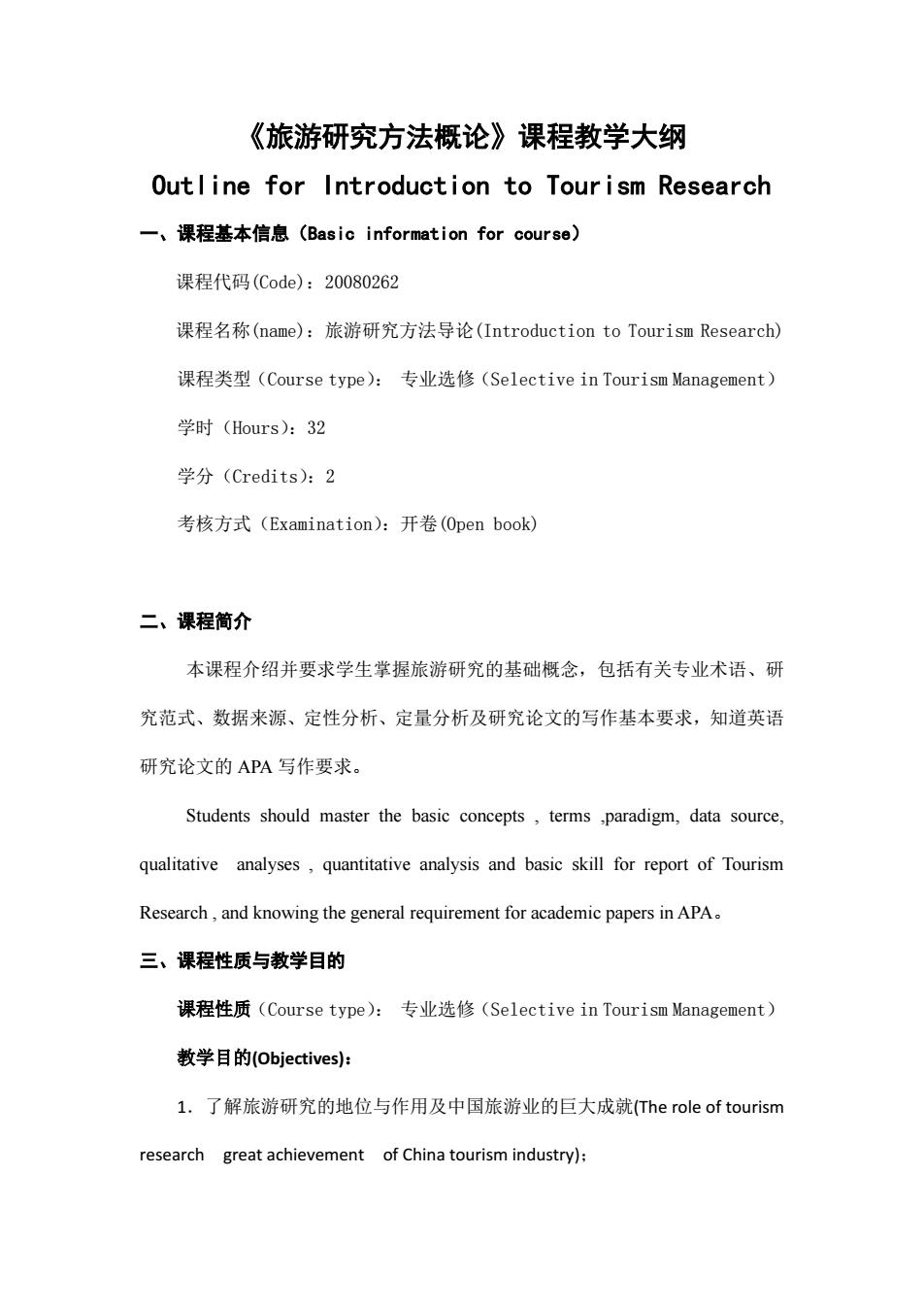
《旅游研究方法概论》课程教学大纲 Outline for Introduction to Tourism Research 一、课程基本信息(Basic information for course). 课程代码(Code):20080262 课程名称(name):旅游研究方法导论(Introduction to Tourism Research) 课程类型(Course type):专业选修(Selective in Tourism Management) 学时(Hours):32 学分(Credits):2 考核方式(Examination):开卷(Open book), 二、课程简介 本课程介绍并要求学生掌握旅游研究的基础概念,包括有关专业术语、研 究范式、数据来源、定性分析、定量分析及研究论文的写作基本要求,知道英语 研究论文的APA写作要求。 Students should master the basic concepts,terms paradigm,data source. qualitative analyses,quantitative analysis and basic skill for report of Tourism Research,and knowing the general requirement for academic papers in APA. 三、课程性质与教学目的 课程性质(Course type):专业选修(Selective in Tourism Management) 教学目的Objectives): 1.了解旅游研究的地位与作用及中国旅游业的巨大成就(The role of tourism research great achievement of China tourism industry):
《旅游研究方法概论》课程教学大纲 Outline for Introduction to Tourism Research 一、课程基本信息(Basic information for course) 课程代码(Code):20080262 课程名称(name):旅游研究方法导论(Introduction to Tourism Research) 课程类型(Course type): 专业选修(Selective in Tourism Management) 学时(Hours):32 学分(Credits):2 考核方式(Examination):开卷(Open book) 二、课程简介 本课程介绍并要求学生掌握旅游研究的基础概念,包括有关专业术语、研 究范式、数据来源、定性分析、定量分析及研究论文的写作基本要求,知道英语 研究论文的 APA 写作要求。 Students should master the basic concepts , terms ,paradigm, data source, qualitative analyses , quantitative analysis and basic skill for report of Tourism Research , and knowing the general requirement for academic papers in APA。 三、课程性质与教学目的 课程性质(Course type): 专业选修(Selective in Tourism Management) 教学目的(Objectives): 1.了解旅游研究的地位与作用及中国旅游业的巨大成就(The role of tourism research great achievement of China tourism industry);

2.旅游研究范式(Theoretical paradigm underpinning tourism research): 3.旅游研究数据来源(Data and empirical material sources for tourism research): 4.旅游研究范式(The ethics of tourism research): 5.旅游研究方法常识(Methodological consideration for tourism reserch) 6.定性旅游研究(Qualitative methods and tourism research) 7.旅游经验数据解释/构建的方法(Qualitative methods of empirical material interpretation/(re)construction) 8.旅游定量研究(Quantitative methods and tourism research) 9.旅游研究标书与报告写作(Tourism research proposals and reports) 四、教学内容及要求(Content and requirements). Chapter 1 the Role of Research in Tourism Objectives: After studying this chapter,the students should be able to: Discuss the nature of tourism as a discipline Understand the role of research in tourism Distinguish between the various types of research Outline the steps involved in research process Identify the phases of the writing process as applied to tourism research. Key knowledge:Understand the role of research in tourism;Distinguish between
2.旅游研究范式(Theoretical paradigm underpinning tourism research); 3.旅游研究数据来源(Data and empirical material sources for tourism research); 4.旅游研究范式(The ethics of tourism research); 5.旅游研究方法常识(Methodological consideration for tourism reserch) 6. 定性旅游研究(Qualitative methods and tourism research) 7.旅游经验数据解释/构建的方法(Qualitative methods of empirical material interpretation/(re)construction) 8.旅游定量研究(Quantitative methods and tourism research) 9.旅游研究标书与报告写作(Tourism research proposals and reports)。 四、教学内容及要求(Content and requirements) Chapter 1 the Role of Research in Tourism Objectives: After studying this chapter, the students should be able to: Discuss the nature of tourism as a discipline Understand the role of research in tourism Distinguish between the various types of research Outline the steps involved in research process Identify the phases of the writing process as applied to tourism research. Key knowledge: Understand the role of research in tourism; Distinguish between
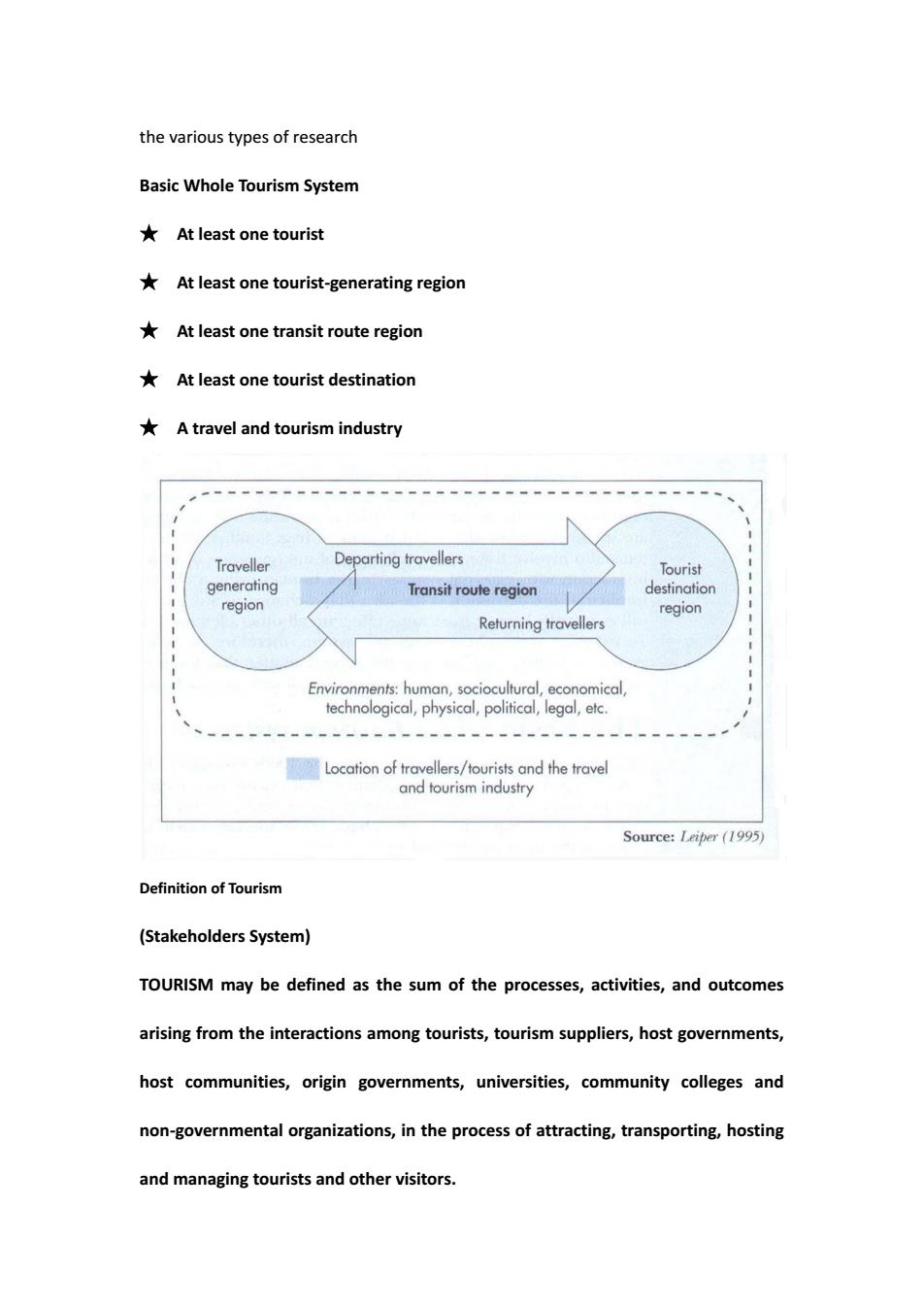
the various types of research Basic Whole Tourism System ★At least one tourist *At least one tourist-generating region ★ At least one transit route region At least one tourist destination A travel and tourism industry Traveller arting travellers Tourist Transit route region destination Returning travellers al,legal,etc. Location of travellers/tourists and the travel and tourism industry Source:Leiper(1995 Definition of Tourism (Stakeholders System) TOURISM may be defined as the sum of the processes,activities,and outcomes arising from the interactions among tourists,tourism suppliers,host governments, host communities,origin governments,universities,community colleges and non-governmental organizations,in the process of attracting,transporting,hosting and managing tourists and other visitors
the various types of research Basic Whole Tourism System ★ At least one tourist ★ At least one tourist-generating region ★ At least one transit route region ★ At least one tourist destination ★ A travel and tourism industry Definition of Tourism (Stakeholders System) TOURISM may be defined as the sum of the processes, activities, and outcomes arising from the interactions among tourists, tourism suppliers, host governments, host communities, origin governments, universities, community colleges and non-governmental organizations, in the process of attracting, transporting, hosting and managing tourists and other visitors
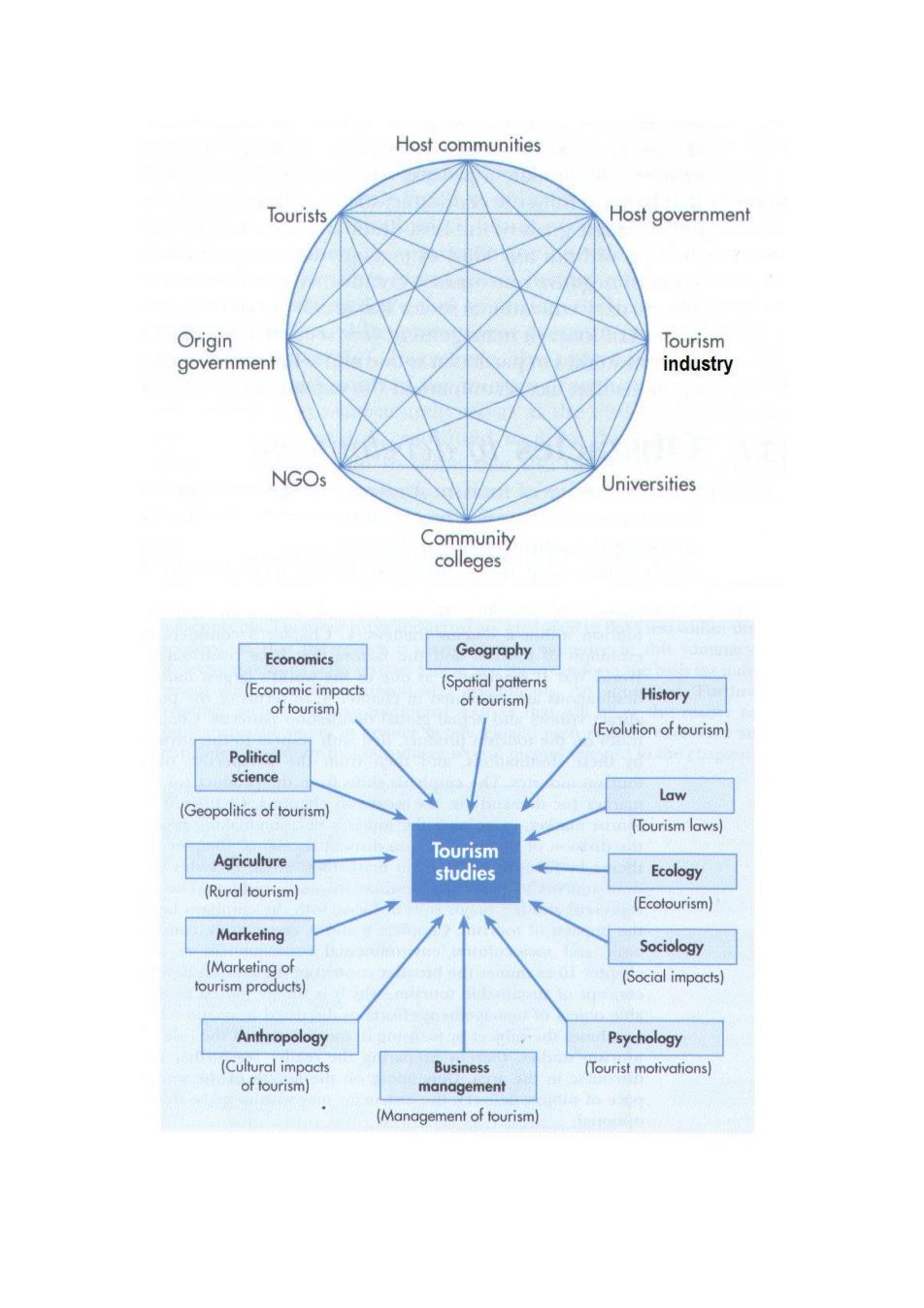
Host communities Tourist Host government Origin Tourism government industry NGOs Universities Economics Geography (Economic impacts History of tourism Political science (Geopolitics of tourism) (Tourism laws) Agriculture Tourism studies Ecology (Rural tourism) (Ecotourism) Marketing Sociology [Marketing of (Social impacts) tourism products) Anthropology Psychology (Cultural impacts Business (Tourist motivations of tourism) management (Management of tourism
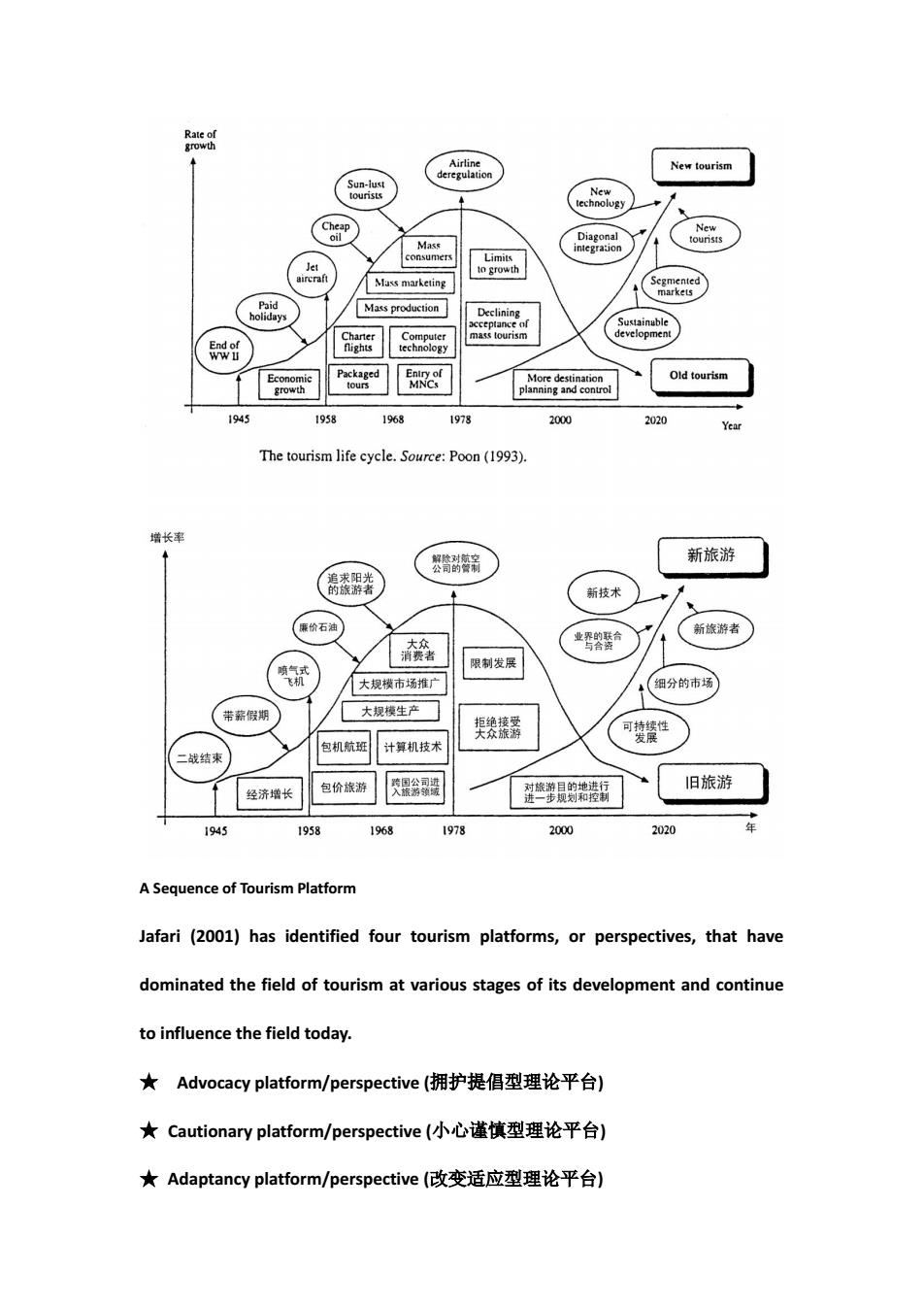
New tourism (a Old tourism 1963 1978 2020 The tourism life cycle.Source:Poon(1993). 气镜】 新旅游 得泰装 新技术) (价石 新游者 限制发展 儿大规市场准 细分的市场 大规模生产☐ 渠埃接 包机航班计算机技术 战结柬 经济增长 包价游含 整 旧旅游 1945 1958 1968 1978 200 2020 A Sequence of Tourism Platform Jafari (2001)has identified four tourism platforms,or perspectives,that have dominated the field of tourism at various stages of its development and continue to influence the field today. ★Advocacy platform/perspective(拥护提倡型理论平台) ★Cautionary platform/,perspective(小心谨慎型理论平台)】 ★Adaptancy platform/perspective(改变适应型理论平台)
A Sequence of Tourism Platform Jafari (2001) has identified four tourism platforms, or perspectives, that have dominated the field of tourism at various stages of its development and continue to influence the field today. ★ Advocacy platform/perspective (拥护提倡型理论平台) ★ Cautionary platform/perspective (小心谨慎型理论平台) ★ Adaptancy platform/perspective (改变适应型理论平台)

★Knowledge--based platform/perspective(以知识为基础的理论平台) ★Advocacy platform/perspective(拥护提倡型理论平台) Tourism is an inherent benefit to communities that should be developed under free market principles.This platform can be described as an "anti-management" perspective,which assumes that tourism is an inherently positive force best left to its own-the role of government,if any,is to facilitate the growth of tourism through the passing of pro-tourism legislation and by maintain law and orde Cautionary platform/perspective(小心谨慎型理论平台) A reaction to the advocacy platform that stresses the negative impacts of tourism and the consequent nee regulation.This platform is a management perspective that perceives tourism to be an inherently destructive force that has to be strictly controlled or avoided altogether Adaptancy platform/perspective(政变适应型理论平台) A follow-up on the cautionary platform that advocates alternative forms of tourism deemed to be more appropriate than the mass tourism fostered by the advocacy platform.In alignment with the cautionary platform,adaptancy platform introduced and articulated concepts that were conceived as more regulated and small-scale alternatives to mass tourism,such as alternative tourism and ecotourism. Knowledge-based platform/perspective(以知识为基础的理论平台((scient, decision for public administration) The most recent dominant perspective in tourism studies,emphasizing ideological
★ Knowledge-based platform/perspective (以知识为基础的理论平台) ★ Advocacy platform/perspective (拥护提倡型理论平台) Tourism is an inherent benefit to communities that should be developed under free market principles. This platform can be described as an “anti-management” perspective, which assumes that tourism is an inherently positive force best left to its own – the role of government, if any, is to facilitate the growth of tourism through the passing of pro-tourism legislation and by maintain law and order. Cautionary platform/perspective (小心谨慎型理论平台) A reaction to the advocacy platform that stresses the negative impacts of tourism and the consequent need for strict regulation. This platform is a management perspective that perceives tourism to be an inherently destructive force that has to be strictly controlled or avoided altogether. Adaptancy platform/perspective (改变适应型理论平台) A follow-up on the cautionary platform that advocates alternative forms of tourism deemed to be more appropriate than the mass tourism fostered by the advocacy platform. In alignment with the cautionary platform, adaptancy platform introduced and articulated concepts that were conceived as more regulated and small-scale alternatives to mass tourism, such as alternative tourism and ecotourism. Knowledge-based platform/perspective (以知识为基础的理论平台)(scientific decision for public administration) The most recent dominant perspective in tourism studies, emphasizing ideological

neutrality and the application of rigorous scientific methodologies to obtain knowledge so that communities can decide whether large-scale or small-scale tourism is most appropriate.Effective management decisions about this complex tourism system are based not on emotion or ideology,but on sound knowledge obtained through the application of the scientific method and informed by relevant models and theories. Academic Discipline ★Indigenous theories Multidisciplinary approach *Interdisciplinary approach Past Present ●Fure ated innut of perspectives om vari Tourism Interdisciplinary DA field of study 2A discipline in its own right An area of emphasis methodologies Industry Sectors and Research Needs Tourism Attractions
neutrality and the application of rigorous scientific methodologies to obtain knowledge so that communities can decide whether large-scale or small-scale tourism is most appropriate. Effective management decisions about this complex tourism system are based not on emotion or ideology, but on sound knowledge obtained through the application of the scientific method and informed by relevant models and theories. Academic Discipline ★ Indigenous theories ★ Multidisciplinary approach ★ Interdisciplinary approach Industry Sectors and Research Needs Tourism Attractions
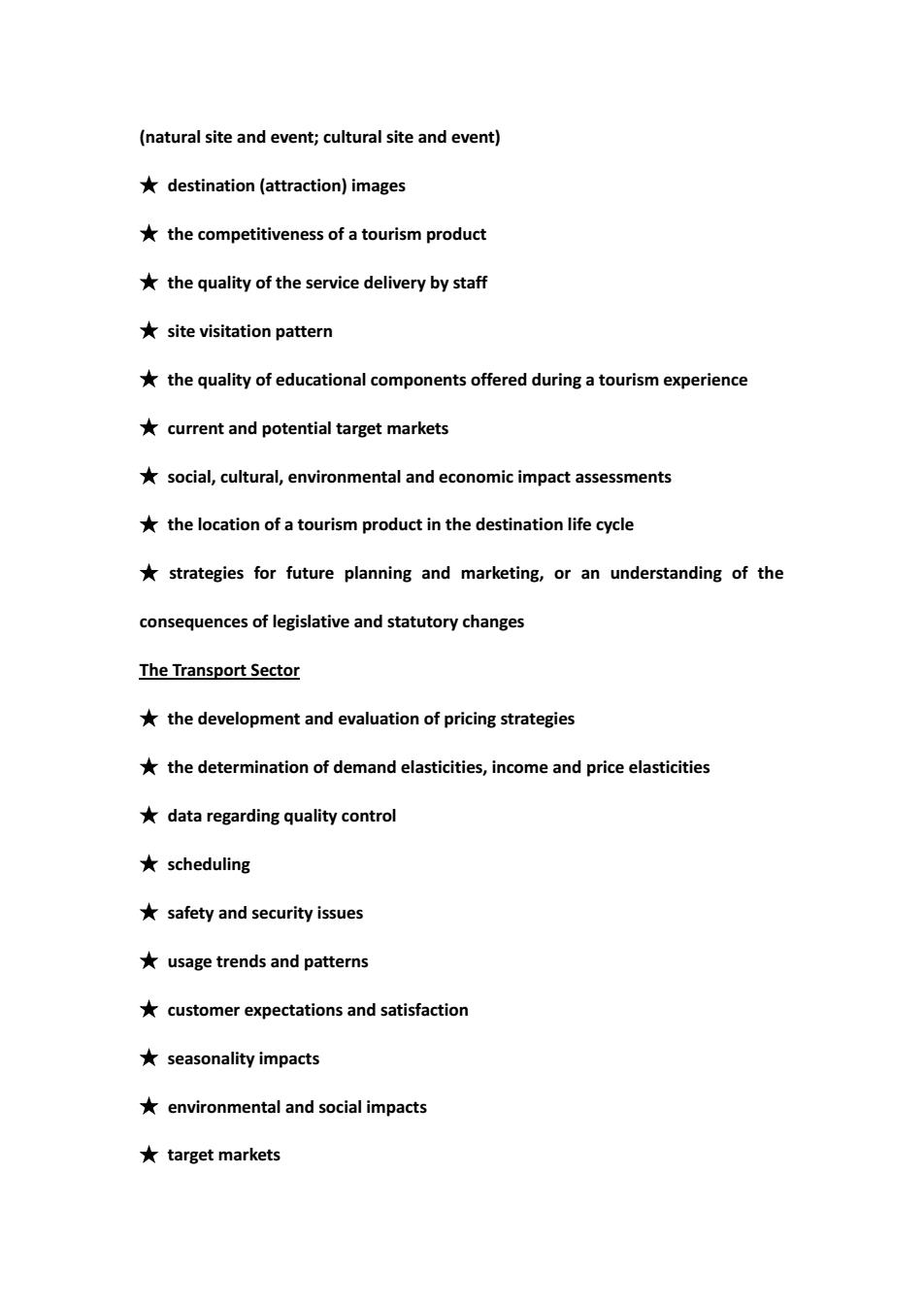
(natural site and event;cultural site and event) *destination(attraction)images *the competitiveness of a tourism product the quality of the service delivery by staff *site visitation pattern *the quality of educational components offered during a tourism experience *current and potential target markets *social,cultural,environmental and economic impact assessments the location of a tourism product in the destination life cycle *strategies for future planning and marketing,or an understanding of the consequences of legislative and statutory changes The Transport Sector the development and evaluation of pricing strategies the determination of demand elasticities,income and price elasticities *data regarding quality control ★scheduling safety and security issues *usage trends and patterns *customer expectations and satisfaction ★seasonality impacts *environmental and social impacts ★target markets
(natural site and event; cultural site and event) ★ destination (attraction) images ★ the competitiveness of a tourism product ★ the quality of the service delivery by staff ★ site visitation pattern ★ the quality of educational components offered during a tourism experience ★ current and potential target markets ★ social, cultural, environmental and economic impact assessments ★ the location of a tourism product in the destination life cycle ★ strategies for future planning and marketing, or an understanding of the consequences of legislative and statutory changes The Transport Sector ★ the development and evaluation of pricing strategies ★ the determination of demand elasticities, income and price elasticities ★ data regarding quality control ★ scheduling ★ safety and security issues ★ usage trends and patterns ★ customer expectations and satisfaction ★ seasonality impacts ★ environmental and social impacts ★ target markets

*competitiveness within the transport sector ★management issues *future forecasting of transport needs *the effectiveness of innovations and technological advancements The Hospitality Sector *quality evaluation and client needs in regard to services,amenities,facilities and their layout the functionality and aesthetics of room designs in accommodation facilities *an evaluation of menu changes and menu contents ★stock control *health and safety issues *education and training requirements ★pricing strategies ★the effectiveness of yield management(收益管理、营收管理)techniques *the effectiveness of loyalty programs ★the development and monitoring of market profiles(市场轮N、市场概况) the evaluation of marketing strategies *competitors and their products ★the development and review of strategies regarding cost-efficiency(成本效益) improvements *an evaluation of management and policies the implications of legislative and statutory changes such as tax systems
★ competitiveness within the transport sector ★ management issues ★ future forecasting of transport needs ★ the effectiveness of innovations and technological advancements The Hospitality Sector ★ quality evaluation and client needs in regard to services, amenities, facilities and their layout ★ the functionality and aesthetics of room designs in accommodation facilities ★ an evaluation of menu changes and menu contents ★ stock control ★ health and safety issues ★ education and training requirements ★ pricing strategies ★ the effectiveness of yield management (收益管理、营收管理) techniques ★ the effectiveness of loyalty programs ★ the development and monitoring of market profiles (市场轮廓、市场概况 ) ★ the evaluation of marketing strategies ★ competitors and their products ★ the development and review of strategies regarding cost-efficiency (成本效益) improvements ★ an evaluation of management and policies ★ the implications of legislative and statutory changes such as tax systems
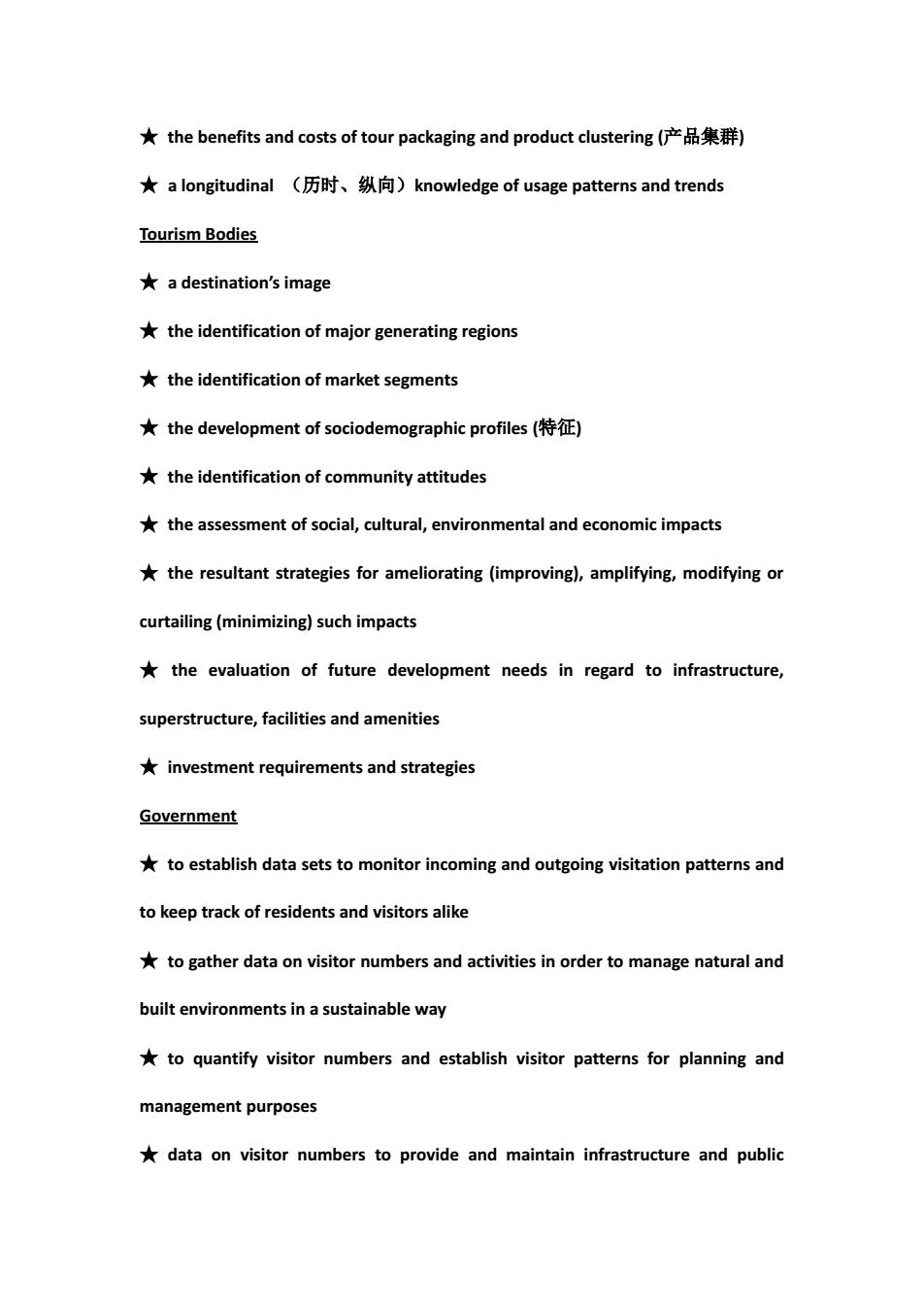
★the benefits and costs of tour packaging and product clustering(产品集群) ★a longitudinal(历时、纵向)knowledge of usage patterns and trends Tourism Bodies a destination's image *the identification of major generating regions *the identification of market segments ★the development of sociodemographic profiles(特征) *the identification of community attitudes the assessment of social,cultural,environmental and economic impacts *the resultant strategies for ameliorating (improving),amplifying,modifying or curtailing(minimizing)such impacts *the evaluation of future development needs in regard to infrastructure, superstructure,facilities and amenities investment requirements and strategies Government *to establish data sets to monitor incoming and outgoing visitation patterns and to keep track of residents and visitors alike *to gather data on visitor numbers and activities in order to manage natural and built environments in a sustainable way *to quantify visitor numbers and establish visitor patterns for planning and management purposes data on visitor numbers to provide and maintain infrastructure and public
★ the benefits and costs of tour packaging and product clustering (产品集群) ★ a longitudinal (历时、纵向)knowledge of usage patterns and trends Tourism Bodies ★ a destination’s image ★ the identification of major generating regions ★ the identification of market segments ★ the development of sociodemographic profiles (特征) ★ the identification of community attitudes ★ the assessment of social, cultural, environmental and economic impacts ★ the resultant strategies for ameliorating (improving), amplifying, modifying or curtailing (minimizing) such impacts ★ the evaluation of future development needs in regard to infrastructure, superstructure, facilities and amenities ★ investment requirements and strategies Government ★ to establish data sets to monitor incoming and outgoing visitation patterns and to keep track of residents and visitors alike ★ to gather data on visitor numbers and activities in order to manage natural and built environments in a sustainable way ★ to quantify visitor numbers and establish visitor patterns for planning and management purposes ★ data on visitor numbers to provide and maintain infrastructure and public